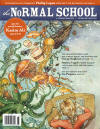The Normal School – 2013
One of my favorite things about The Normal School is that the editors are so willing to try something new, but they never leave the reader behind. Managing Editor Sophie Beck and her team begin a new experiment in this issue, adding recurring columns: Joe Bonomo will write about music, William Bradley will take on comics, and Phillip Lopate will submit musings about films.
One of my favorite things about The Normal School is that the editors are so willing to try something new, but they never leave the reader behind. Managing Editor Sophie Beck and her team begin a new experiment in this issue, adding recurring columns: Joe Bonomo will write about music, William Bradley will take on comics, and Phillip Lopate will submit musings about films.
Ay?e Papatya Bucak kicks off the issue in fine style with her story, “The Missing Beloved, The Gathering of Desire.” The piece centers upon an odd kind of love triangle that involves a widowed mother, a chess master known as “S.” and the Mechanical Turk, a real-life historical curiosity. (Long before the advent of the microprocessor, The Turk was presented to audiences as a machine capable of playing and beating all volunteers. The secret? The human concealed in the machine’s works.) Bucak’s story brought to mind a personal favorite: Ben Fountain’s award-winning story, “Fantasy for Eleven Fingers.” Like Fountain, Bucak is careful not to allow the history to overwhelm what is a timeless story seen through an unexpected lens. Millions of people were fooled into believing that the Mechanical Turk was real; why can’t its operator begin to believe in its sentience?
Bradley’s piece about comic books has one major flaw: it’s too short! It seems that the primary goal of his first Normal School column was to introduce himself and establish his experience with and view of the comic book landscape. Bradley begins with a heartbreaking anecdote, informing the reader about Curt Swan, one of the titular “men of yesterday.” Like so many of the work-for-hire writers and artists whose creations have made billions for Marvel and DC, Swan received a relative pittance for his drawings. Bradley was at a comic book convention in 1994, spying Swan sitting alone at a folding table and doing a crossword puzzle in blue ballpoint pen. Understandably, teenage Bradley was most familiar with more recent artists, but he still paid good-hearted but faint homage to the man who contributed a great deal to our understanding of Superman. Bradley uses the story to point out, with a somewhat heavy heart, that comic creators must move on from the Golden and Silver Ages and must capture the imaginations of the young generation.
Kristen Radtke confronts entropy and evolution in her essay, “The City of the Century: Gary, Indiana.” Although Gary is now representative of the decay of the Rust Belt, the city was once beautiful and once thrived. Radtke describes her acts of urban archaeology and is most persuasive when describing the relics she removed from a crumbling theater: pictures taken by a young man who was killed by the train he was photographing. The most impressive move Radtke makes in the essay is to communicate the deep humanity in the stories of Gary and of the young photographer.
Charlie Clark’s poetry possesses a deceptive kind of momentum. In “Devil in the Holy Land,” he seems to be carving each line out of marble, syllable by syllable. The poem’s protagonist seems to be biding his time in a place in which
The cafés have a kind
of tea that is just
the temperature and taste
of air breathed in summer
Clark imbues the poem’s placid tone with a delightful undercurrent of impending doom.
A small town has a big problem: all of the men have “disappeared into the night” without a trace. So begins Brett Beach’s intriguing “Elderberry,” a story whose structure is as notable as its conceit. Beach unspools the narrative over the course of thirty-one questions: “What did the townswomen think had happened?” “How did the townspeople continue on?” “What change came over Elderberry?” The women of Elderberry act in expected and unexpected ways. Above all, they remind us how much people need each other, regardless of the demographic groups to which they happen to belong.
With its wide range of works of varying lengths in an attractive magazine-sized format, The Normal School possesses the qualities that make it one of my go-to journals and one I often recommend to others.
[www.thenormalschool.com]





